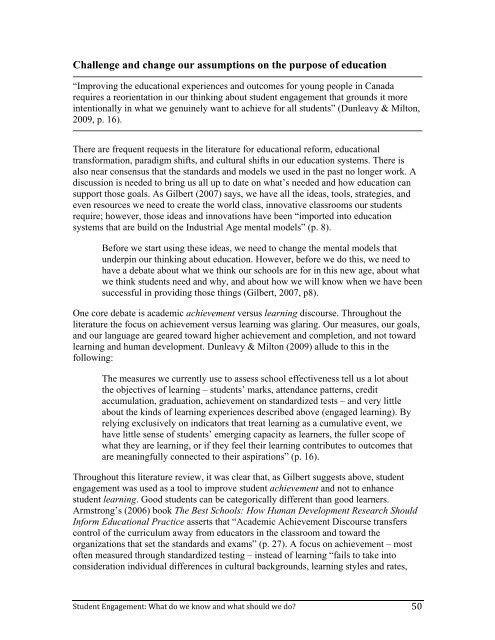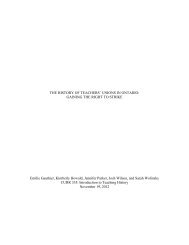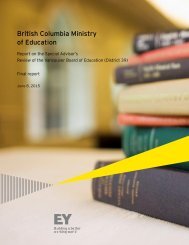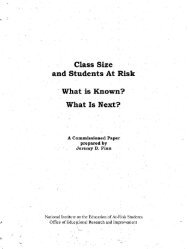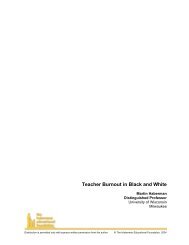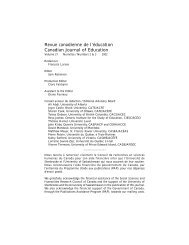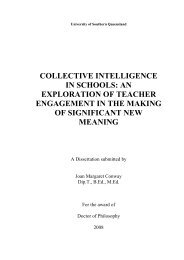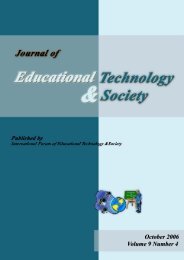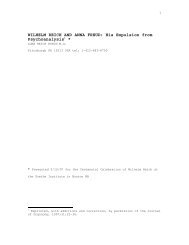Student Engagement: What do we know and what should we do?
Student Engagement: What do we know and what should we do?
Student Engagement: What do we know and what should we do?
Create successful ePaper yourself
Turn your PDF publications into a flip-book with our unique Google optimized e-Paper software.
Challenge <strong>and</strong> change our assumptions on the purpose of education<br />
“Improving the educational experiences <strong>and</strong> outcomes for young people in Canada<br />
requires a reorientation in our thinking about student engagement that grounds it more<br />
intentionally in <strong>what</strong> <strong>we</strong> genuinely want to achieve for all students” (Dunleavy & Milton,<br />
2009, p. 16).<br />
There are frequent requests in the literature for educational reform, educational<br />
transformation, paradigm shifts, <strong>and</strong> cultural shifts in our education systems. There is<br />
also near consensus that the st<strong>and</strong>ards <strong>and</strong> models <strong>we</strong> used in the past no longer work. A<br />
discussion is needed to bring us all up to date on <strong>what</strong>’s needed <strong>and</strong> how education can<br />
support those goals. As Gilbert (2007) says, <strong>we</strong> have all the ideas, tools, strategies, <strong>and</strong><br />
even resources <strong>we</strong> need to create the world class, innovative classrooms our students<br />
require; ho<strong>we</strong>ver, those ideas <strong>and</strong> innovations have been “imported into education<br />
systems that are build on the Industrial Age mental models” (p. 8).<br />
Before <strong>we</strong> start using these ideas, <strong>we</strong> need to change the mental models that<br />
underpin our thinking about education. Ho<strong>we</strong>ver, before <strong>we</strong> <strong>do</strong> this, <strong>we</strong> need to<br />
have a debate about <strong>what</strong> <strong>we</strong> think our schools are for in this new age, about <strong>what</strong><br />
<strong>we</strong> think students need <strong>and</strong> why, <strong>and</strong> about how <strong>we</strong> will <strong>know</strong> when <strong>we</strong> have been<br />
successful in providing those things (Gilbert, 2007, p8).<br />
One core debate is academic achievement versus learning discourse. Throughout the<br />
literature the focus on achievement versus learning was glaring. Our measures, our goals,<br />
<strong>and</strong> our language are geared toward higher achievement <strong>and</strong> completion, <strong>and</strong> not toward<br />
learning <strong>and</strong> human development. Dunleavy & Milton (2009) allude to this in the<br />
following:<br />
The measures <strong>we</strong> currently use to assess school effectiveness tell us a lot about<br />
the objectives of learning – students’ marks, attendance patterns, credit<br />
accumulation, graduation, achievement on st<strong>and</strong>ardized tests – <strong>and</strong> very little<br />
about the kinds of learning experiences described above (engaged learning). By<br />
relying exclusively on indicators that treat learning as a cumulative event, <strong>we</strong><br />
have little sense of students’ emerging capacity as learners, the fuller scope of<br />
<strong>what</strong> they are learning, or if they feel their learning contributes to outcomes that<br />
are meaningfully connected to their aspirations” (p. 16).<br />
Throughout this literature review, it was clear that, as Gilbert suggests above, student<br />
engagement was used as a tool to improve student achievement <strong>and</strong> not to enhance<br />
student learning. Good students can be categorically different than good learners.<br />
Armstrong’s (2006) book The Best Schools: How Human Development Research Should<br />
Inform Educational Practice asserts that “Academic Achievement Discourse transfers<br />
control of the curriculum away from educators in the classroom <strong>and</strong> toward the<br />
organizations that set the st<strong>and</strong>ards <strong>and</strong> exams” (p. 27). A focus on achievement – most<br />
often measured through st<strong>and</strong>ardized testing – instead of learning “fails to take into<br />
consideration individual differences in cultural backgrounds, learning styles <strong>and</strong> rates,<br />
<strong>Student</strong> <strong>Engagement</strong>: <strong>What</strong> <strong>do</strong> <strong>we</strong> <strong>know</strong> <strong>and</strong> <strong>what</strong> <strong>should</strong> <strong>we</strong> <strong>do</strong>? 50


